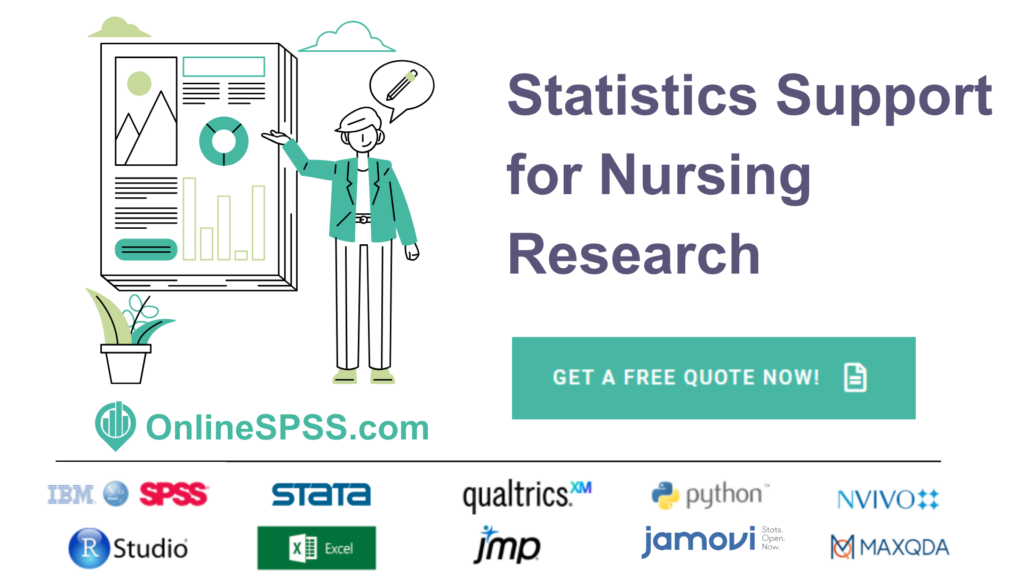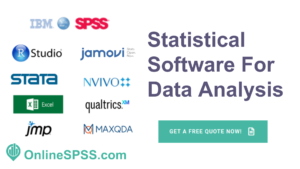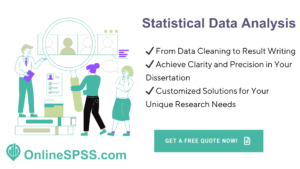1. Introduction to Statistics Support for Nursing Research
Statistics plays a crucial role in nursing research, ensuring that healthcare studies are evidence-based, reliable, and data-driven. Proper statistical techniques help researchers analyze patient outcomes, evaluate nursing interventions, and improve healthcare decision-making.
Many nursing students and researchers encounter challenges such as choosing the correct statistical test, understanding complex datasets, and applying software like SPSS, R, or Python. Without expert guidance, misinterpretation of data can lead to flawed conclusions, affecting patient care and policy decisions.
OnlineSPSS.com offers professional statistics support for nursing research, providing expert assistance in data collection, statistical analysis, and interpretation to improve research accuracy and credibility.

2. What is Nursing Research?
Nursing research is the systematic investigation of health-related issues to improve patient care, clinical practice, and healthcare policies. It provides scientific evidence that shapes nursing interventions and enhances patient outcomes.
Nursing research focuses on various critical areas, including:
- Clinical trials – Evaluating the effectiveness of new treatments and interventions.
- Patient outcomes research – Assessing how healthcare practices influence patient recovery.
- Healthcare policies – Studying how policies impact nursing practices and patient care.
- Nursing interventions – Investigating best practices for improving nursing strategies in clinical settings.
By applying statistics in nursing research, professionals can assess interventions’ effectiveness and contribute to evidence-based healthcare improvements.
3. Data Types in Nursing Research
Understanding data types is essential in nursing research as they determine the statistical approach to be used.
- Quantitative data involves numerical values that can be measured and analyzed statistically, such as patient recovery rates, medication adherence, or blood pressure readings.
- Qualitative data captures non-numerical insights, including patient experiences, nurse-patient interactions, and perceptions regarding treatments.
Common Data Collection Methods:
Nursing research utilizes various data collection methods, including:
- Surveys and questionnaires – Used to gather self-reported patient or nurse experiences.
- Patient records and electronic health records (EHRs) – A valuable source for retrospective studies.
- Experimental studies – Conducting controlled trials to assess the impact of interventions.
Selecting the right data type ensures appropriate statistical analysis for meaningful results.

4. Quantitative Data Analysis for Nursing Research
Quantitative data analysis is a critical component of nursing research. It allows researchers to derive objective conclusions through statistical methods.
Key Statistical Methods Used:
- Descriptive statistics – Summarizes data using measures like mean, median, and standard deviation to describe trends in patient outcomes.
- Inferential statistics – Includes t-tests, chi-square tests, and regression models to determine relationships between variables and make predictions.
- Survival analysis – Techniques like Kaplan-Meier and Cox Regression help evaluate time-to-event data, such as patient survival rates.
Applying the right statistical method ensures that findings are valid, reliable, and applicable to real-world nursing practice.
5. Statistical Software for Nursing Research (SPSS, R, Python)
Selecting the right statistical software enhances the efficiency and accuracy of nursing research data analysis.
- SPSS (Statistical Package for the Social Sciences) – Popular in nursing research for its user-friendly interface and robust statistical functions.
- R – A powerful open-source tool for complex statistical modeling and visualizations.
- Python – Ideal for handling large datasets and advanced analytics.
Each software offers unique benefits, and choosing the right tool depends on the study’s complexity and research objectives.

6. How to Write a Methodology for Nursing Research
The methodology section provides a roadmap for the study, detailing how data is collected and analyzed.
Key Components of a Nursing Research Methodology:
- Study Design – Defines whether the study is experimental, observational, longitudinal, or cross-sectional.
- Data Collection Methods – Describes how data is obtained, including participant recruitment, instruments used, and study duration.
- Statistical Techniques – Outlines which tests will be applied to analyze the data, ensuring validity and reliability.
- Ethical Considerations – Ensures compliance with ethical research standards, including informed consent and confidentiality.
A well-structured methodology provides transparency and reproducibility, strengthening the research’s credibility.
7. How to Write a Results Section for Nursing Research
The results section presents the findings in a structured and easy-to-understand manner.
How to Report Research Results:
- Descriptive statistics – Summarizes data trends using tables and figures.
- Inferential statistics – Reports statistical tests and p-values to determine significance.
- Graphs and charts – Visual representations such as bar charts, scatter plots, and survival curves improve data clarity.
- APA Style Formatting – Ensures standardized reporting for academic and professional publishing.
Presenting results effectively helps readers interpret data accurately and understand the study’s impact.

8. Why You Need Statistics Support for Nursing Research
Conducting statistical analysis for nursing research can be complex, and many researchers face common challenges, such as:
- Choosing the correct statistical test for their research question.
- Handling large datasets and ensuring data integrity.
- Interpreting results in a clinical context.
- Formatting findings in APA style for journal submissions.
Seeking expert statistics support ensures high-quality research and enhances publication success.
9. How Our Statistics Support for Nursing Research Works
We provide structured statistics support for nursing research through a simple three-step process:
- Submit Your Research Details – Share your project’s scope, research questions, and statistical requirements.
- Receive a Free Quote – Get a customized price based on your data analysis needs.
- Get Expert Analysis – Our statisticians conduct data analysis, interpret findings, and provide a structured APA-style report.
This process ensures efficient and accurate statistical analysis for nursing research.
10. Get Expert Statistics Support for Nursing Research Today
If you need professional assistance with statistics support for nursing research, OnlineSPSS.com offers:
- Expert SPSS, R, STATA and more analysis.
- Accurate statistical interpretations tailored to nursing research.
- Fast turnaround with 100% confidentiality.
Accurate statistical analysis is essential for evidence-based nursing research. Whether you need help with quantitative analysis, methodology writing, or results interpretation, OnlineSPSS.com provides expert support.
✅ Get a free quote today and take your nursing research to the next level with professional statistics support!
Ready to Get Started?
Don’t let statistical challenges hold you back from completing your PhD thesis. At OnlineSPSS.com, we make statistical analysis straightforward, ensuring your research is credible and impactful.
Contact us today to request a free consultation and take the first step toward academic success!
Follow us on LinkedIn











